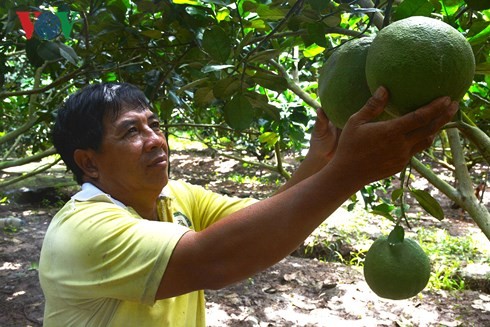(VOVWORLD) - Phu Vinh commune in An Giang province has been restructuring its farming and animal husbandry. Many households have begun growing fruit trees, which is more profitable than growing rice. Phan Anh, VOV’s correspondent in the Mekong Delta region, reports on how local farmers earn tens of thousands of dollars per year growing green-skin pomelos.
|
 Tang Tan Hung, a farmer of Phu Vinh commune, in his green-skin pomelo garden (Photo: Phan Anh/VOV) Tang Tan Hung, a farmer of Phu Vinh commune, in his green-skin pomelo garden (Photo: Phan Anh/VOV)
|
Tang Tan Hung grows 4 ha of rice in Phu Vinh commune. In the past, although his family invested a lot of money and effort in rice farming that profits were very low.
Hung said: “Previously it was very hard to grow rice and profits were low. School fees for my children were expensive. I converted part of my land to growing grass for cows, but the result wasn’t much better than with the rice.”
Hung then learned new farming techniques from fruit tree farmers. In early 2013, he converted 3,000 square meters of rice fields to growing 400 green-skin pomelo trees.
Hung’s orchard has grown and has become very productive. He has expanded his orchard to more than 1 ha with about 1,400 pomelo trees.
He said last year his family harvested 25 tons of pomelos, earning 44,000 USD. Hung told VOV: “Following fact-finding tours, I applied what I learned. Growing pomeloes is harder than rice farming. It takes more time but it is more profitable. Because of strong prices, our living conditions have improved and we have saved up some capital.”
Determined to overcome all difficulties, Hung made a successful shift from rice farming to growing fruit trees. For years now, Hung’s family has been recognized as a farm household excelling in production and trading in An Giang province. Hung has become a role model for other farmers to follow. He now supplies pomelo seedlings and shares farming techniques with other farmers.
Le Thanh Tung, Deputy Chairman of the Phu Vinh commune People’s Committee, said Hung’s crop restructuring model is on the right track, matching the province’s goal of restructuring local agriculture.
Phu Vinh has nearly 1,300 ha of farmland. 25 ha have been converted to growing fruit trees. The commune’s People’s Committee is calling on local farmers to follow suit in a sustainable manner.
According to Tung, “rice farming is becoming less profitable and rice prices are unstable. Out fruit orchards are still small. In the future, we will persuade local farmers who have small rice fields, or whose farmland is no longer fertile, to start growing fruit trees to increase their incomes and improve their living conditions.”